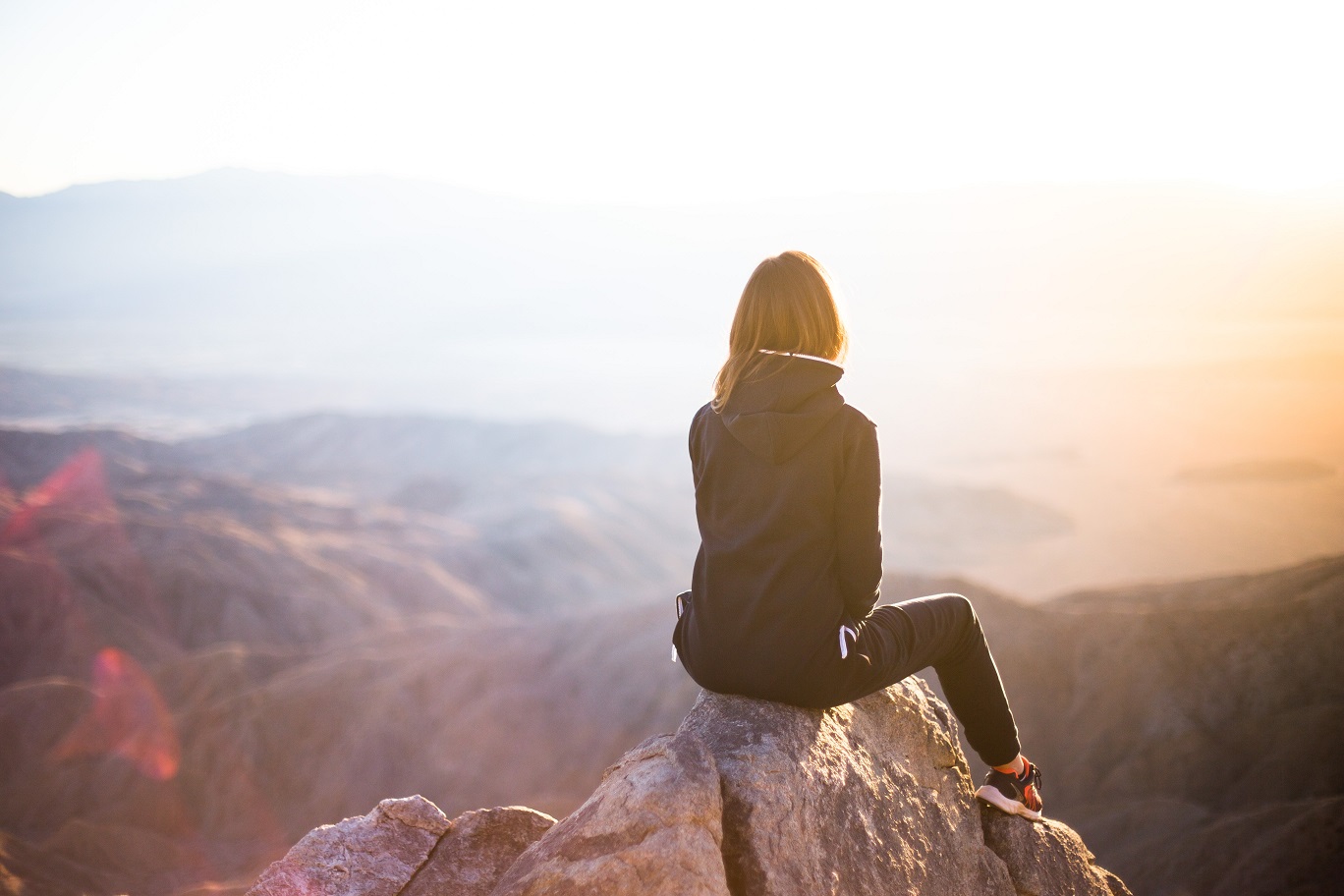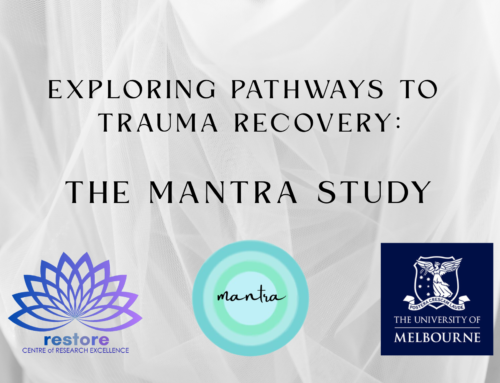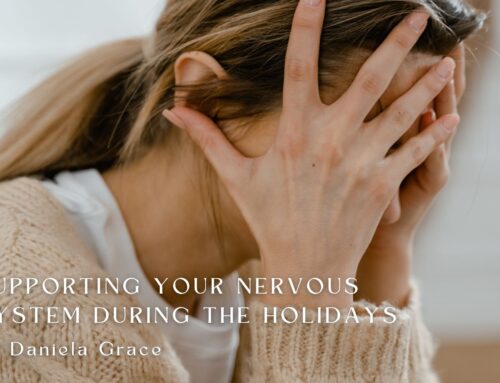Sally Liston, CyberScan/Access Bars practitioner:
Being in the ocean or the bush is always very nurturing and rejuvenating for my mind & body. Otherwise yoga nidra helps me sleep if my mind is racing and asking questions like “who does this belong to?”
Meg Steele, Kundalini Yoga teacher & Music Therapist:
Listen to mantra. Although from a music therapy perspective it can be helpful to match your mood / feelings before you attempt to shift them. So if I’m feeling stressed, then I don’t immediately put on a slow, ‘calming’ piece of music – instead I choose something with a fast tempo and steady beat to match my internal feelings. Then after a time I can change this to something more soothing if I like. My fave go to track when I’m feeling anxious is ‘Har’ from The Green Light of Prosperity album.
Jaye Hayes, Restorative Yoga teacher:
JAYE’S SOMATIC MEDITATION FOR SOOTHING THE HEART
Rest your right hand onto the left side of your chest over the heart area.
Place it in a way that doesn’t amplify your awareness of your heartbeat but simply brings comfort to the area.
You can cross the other arm over your chest if that feels comfortable & supportive.
Close your eyes & let your gaze rest towards the heart.
Breathing in & out through the nose, allow the breath to flow gently.
Notice the coolness of the breath.
Notice the gentle movement your breath towards your heart.
Feel the space in & around your heart cooling & softening.
Practice this daily during times of stress.
Jodie Cicaji, Psychologist:
One of my biggest tips is taking a “Self compassion break” – doing a five minute meditation to ground, acknowledge things are hard right now, offer perspective that stress is something we all experience, and offer kind and supportive self statements that are uplifting. Being in nature, particularly bushwalking and talking it out also really help!
Alla Demutska, Clinical Psychologist :
For maintenance
Regular exercise reduces levels of anxiety and stress on a more permanent basis. I also have treatments, such as acupuncture and massage. Seeing friends and going for walks in nature form an important part of my long-term strategies.For immediate support
Slowing down my breathing, and using ujai breath. Naming what is going on in my body and what colour, shape, or other sensory attributes the stress/anxiety has is helpful, too. I ask myself: what do I need? If the stress and anxiety are really strong, I go for a strong walk or dancing.
Regular exercise reduces levels of anxiety and stress on a more permanent basis. I also have treatments, such as acupuncture and massage. Seeing friends and going for walks in nature form an important part of my long-term strategies.For immediate support
Slowing down my breathing, and using ujai breath. Naming what is going on in my body and what colour, shape, or other sensory attributes the stress/anxiety has is helpful, too. I ask myself: what do I need? If the stress and anxiety are really strong, I go for a strong walk or dancing.
Miranda Phaedonos, Osteopath:
When I feel overwhelmed with what life’s throwing at me, I put on my “de – stress” playlist and practice yoga. This helps to take my mind off the current tasks/issues that may be worrying me and focus on my own wellbeing.
I find that closing my eyes, bringing my awareness to my breath, especially the exhale, for around 3-5 minutes really helps to overcome bouts of anxiety. This helps to release any tension within the diaphragm, a vital muscle in breathing, which is directly related to our nervous system. This breath awareness allows my body to move into more of a parasympathetic (calmer) state.
Going for a bike ride and travelling somewhere beachside are two things that I love doing regularly as both help me stay connected with nature.
Riding also gives my body the movement and cardiovascular exercise it needs to help keep calm, while the sound and feel of the ocean is meditative in itself.
Gemma Shaw, KH reception team:
I drink lots of water and have a shower. I change my bed linen and burn sage in the house, then I make myself a cup of tea and get into my comfy cozy bed.
Jodie Cicaji, Psychologist:
One of my biggest tips is taking a “Self compassion break” – doing a five minute meditation to ground, acknowledge things are hard right now, offer perspective that stress is something we all experience, and offer kind and supportive self statements that are uplifting. Being in nature, particularly bushwalking and talking it out also really help!
Namo Dev, Kundalini Yoga teacher & Healing practitioner:
– Left nostril breathing is always an immediate calming tool during times of stress and anxiety. Simply block off the right nostril and breath long, slow and deep through the left nostril from as little as 3 minutes.
– Bach Flower Rescue Remedy is always on hand for those moment where I can’t think of anything else. A few drops under my tongue for acute situations, or for stress of longer duration I just add a few drops to my water bottle and sip on it for the rest of the day. I also use specific homeopathic remedies to get to the root of my stress reactions.
– A long bath with 1kg (yep, 1 KG) of Epsom Salts and some lavender oil is a great soother.
– A warm sesame or almond oil self massage before I go to bed followed by a hot shower (a little Ayurvedic tip).
– Talking a long brisk walk, whether it’s just around my neighbourhood or out in the peace of nature to clear my head.
Jane Johnston, Kundalini Yoga teacher & Hypnotherapist:
I teach controlled breath work Prana Yama
to slow the inhale (really breathing into all spaces in the lungs) followed by long slow exhale (as though a tiny straw is between the lips) slow controlled exhale, relaxing the jaw, neck, throat and shoulders .
Inhale calm relaxation and exhale any tension as above. Do this OVER and OVER and OVER….








Leave A Comment